The women stand in one of the large Crusader-era halls in the Old City of Acco (Acre) and I am among them. As we gather together among the stone pillars and arches, every footstep echoes with the memory of the different people who have walked through these rooms over the distance of time. Citadel, fortress, dungeon, prison – now a UNESCO world heritage site, the halls are also a theatre venue. We are the audience: members of the women’s council of Dir Hana, two men and me. We stand in the hall, waiting.
Afif Shlewet, the director, addresses the audience, but I do not know what he is saying, because he is speaking in Arabic. I have come to see The Prisoner, written by Naif Faiz Khouri and performed by Halil Kadoura, one of five new plays presented in the Masrahid 2010 Festival of monodramas in Arabic. Although I do not understand the language in which the play is written, the experience of theatre is not diminished by the language barrier. If anything, the communicative aspect of theatre is enhanced, with the focus on the visual, physical and emotional aspects of the play and performance. Inevitably, my lack of understanding becomes an element of my response to the play, similar to someone encountering Shakespearean English for the first time, and yet – nothing like that at all. The encounter between people, text and place is a powerful one.
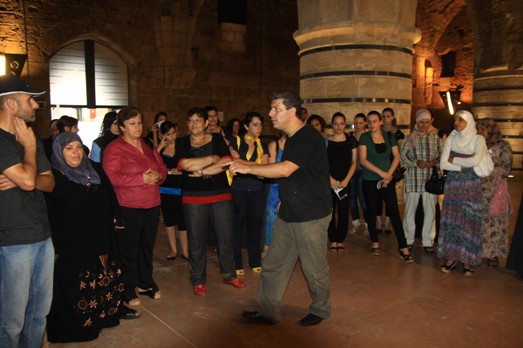
There is no stage, no set, no props – and I have no idea what is going on. Shlewet finishes speaking and another man begins to speak: the play has begun. Kadoura speaks to the group – this may be a monodrama, but it is clearly a dialogue. Money is involved in this story – is it a debt he owes? He moves like someone taking a blow, someone is attacking him. Kadoura moves in the large hall, away from the audience. They hang back, unsure. In this unusual venue, a different sort of theatre is taking place, in which uncertainty is part of the plan.
He comes in close again, now addressing his words to a young woman standing near one of the stone pillars. She looks away, not meeting his gaze as he speaks to her. Yet he persists, talking, asking her questions. Eventually, she looks at him and says something in a low voice. Then she looks away again. It is not only the language you speak that makes communication difficult.
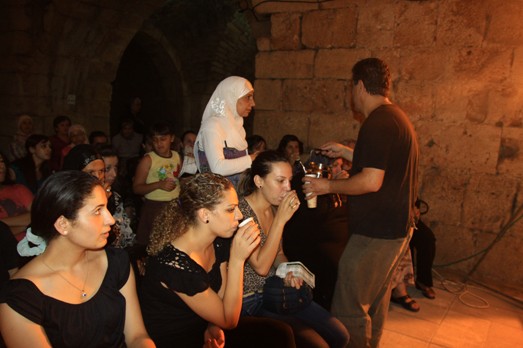
Kadoura’s eyes and gestures speak with urgency and eloquence. He motions to the audience to follow him and we walk to a door. He warns us that there are stairs. We are led down a narrow passageway. Walking through the twists and turns of the dimly lit passage, there is the murmur of conversation and the occasional nervous laugh. The ceiling becomes lower and towards the end we walk hunched over in the dark, constricted space. The walk seems endless; I feel as if I can’t get enough air. Then we reach the doorway where Kadoura stands waiting. Walking down a few stairs we enter another room where an impromptu theatre has been set up: lights, plastic chairs arranged in rows and a stage of sorts – a sheet and pillow spread on the floor, with a hot plate, tea pot and container of sugar lined up at the back near the stone wall. A prison cell.
Kadoura hands out small paper cups and pours tea for the audience, assisted by one of the women. We drink the hot sweet tea. The young woman sitting next to me tries to help me by translating his words into Hebrew. I feel grateful and guilty; glad to understand and have some of my conjectures about the narrative confirmed, worried that the accident of being my neighbor and burden of translation will deprive her of the full experience of the play itself.
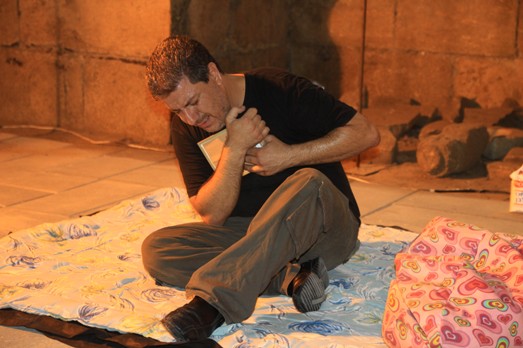
She says: he is in prison, he feels suffocated, he has no air. Kadoura talks to a man sitting behind me, making him a participant in this drama. Although I do not understand the words, the feelings need no words as we enter the stories of the different people in the prison, sitting together in a room that might have been a Crusader dungeon, like a group of prisoners on a tea break. He walks away, and we follow him once more to another room where he stands against the wall.
The mood is solemn, his questions to the audience tinged with sadness. Kadoura lights a taper. Then the sound of the Muezzin comes through the flow of words. There is a moment of hesitation; there is no protocol for what to do when theatre and life converge. We concur, almost without words: we will wait.
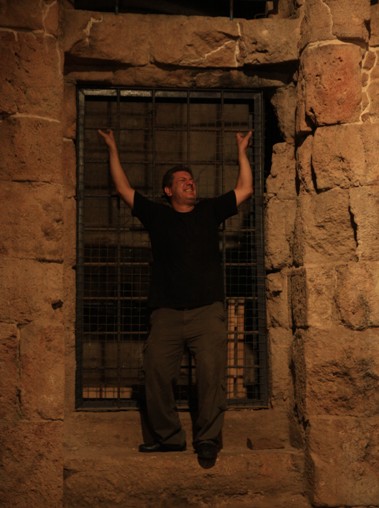
Back in the narrative, his back against the wall, Kadoura jumps up on the window ledge, then cries out, jumps down and disappears down the hall. We follow and reach the play’s conclusion, a room more full of questions than answers.
I want to thank my translator, but cannot find her in the crowd. I do find Shlewet and in the few moments between performances (there were two each night during the festival), we talk about The Prisoner and theatre.
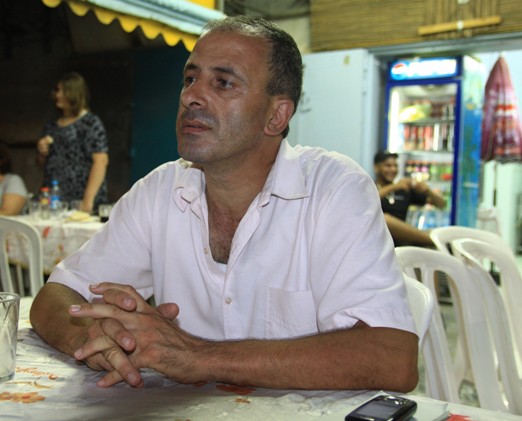
Shlewet explained that he chose the unconventional treatment of space and directing because he wanted the audience to experience the pain of the prisoners, most incarcerated because of a foolish mistake, a wrong decision taken. This is similar to his approach to other plays he has written and directed, most recently a Hebrew version of his play Confessions of a Political Whore, directed by Arie Yass at the Theatroneto Festival 2010.
“I don’t like acting that is clearly acting,” said Shlewet, “it distances the audience. I want there to be a real encounter between the actor and the audience, to find a bridge between acting and truth. This is why I intentionally chose to present the play without music.”
Currently pursuing a Master’s Degree in Comparative Literature at the University of Haifa, Shlewet has published several books, including a history of Palestinian Theatre from 1900 to the present. Manager of the Alo Foq Association for Culture and Arts, he is actively involved in theatre and social issues. What angers him? “I am always asked about Arabs and Jews,” says Shlewet, “I’m tired of talking about it. I would like to reach a point where I can talk about social issues to a general audience and not remain confined in the Arab-Jewish box.”
AYELET DEKEL





